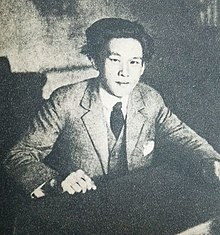You can help expand this article with text translated from the corresponding article in Japanese. (September 2018) Click for important translation instructions.
|
| Riichi Yokomitsu 横光 利一 | |
|---|---|
 Riichi in 1928 Riichi in 1928 | |
| Born | (1898-03-17)17 March 1898 Higashiyama Onsen, Fukushima, Japan |
| Died | 30 December 1947(1947-12-30) (aged 49) |
| Occupation | Novelist, short-story writer |
| Alma mater | Waseda University |
| Genre | Fiction |
| Notable works | |
Riichi Yokomitsu (横光 利一, Yokomitsu Riichi, 17 March 1898 – 30 December 1947) was an experimental, modernist Japanese writer.
Yokomitsu began publishing in dōjinshi such as Machi ("Street") and Tō ("Tower") after entering Waseda University in 1916. In 1923, he published Nichirin ("The Sun"), Hae ("A Fly") and more in the magazine Bungeishunjū, which made his name popular. The following year he started the magazine Bungei-Jidai with Yasunari Kawabata and others. Yokomitsu and others involved in Bungei-Jidai were known collectively as the Shinkankakuha, or the New Sensation School, with a particular interest in sensation and scientific objectivity.
References
- Keene, Dennis (1980). Yokomitsu Riichi: Modernist. Columbia University Press. ISBN 9780231049382.
- Washburn, Dennis (2007). Translating Mount Fuji: Modern Japanese Fiction and the Ethics of Identity. Columbia University Press. p. 147. ISBN 9780231138925.
External links
- Synopsis of Shanghai (Shanhai) at JLPP (Japanese Literature Publishing Project) (in English)
This article about a Japanese writer, poet, or screenwriter is a stub. You can help Misplaced Pages by expanding it. |